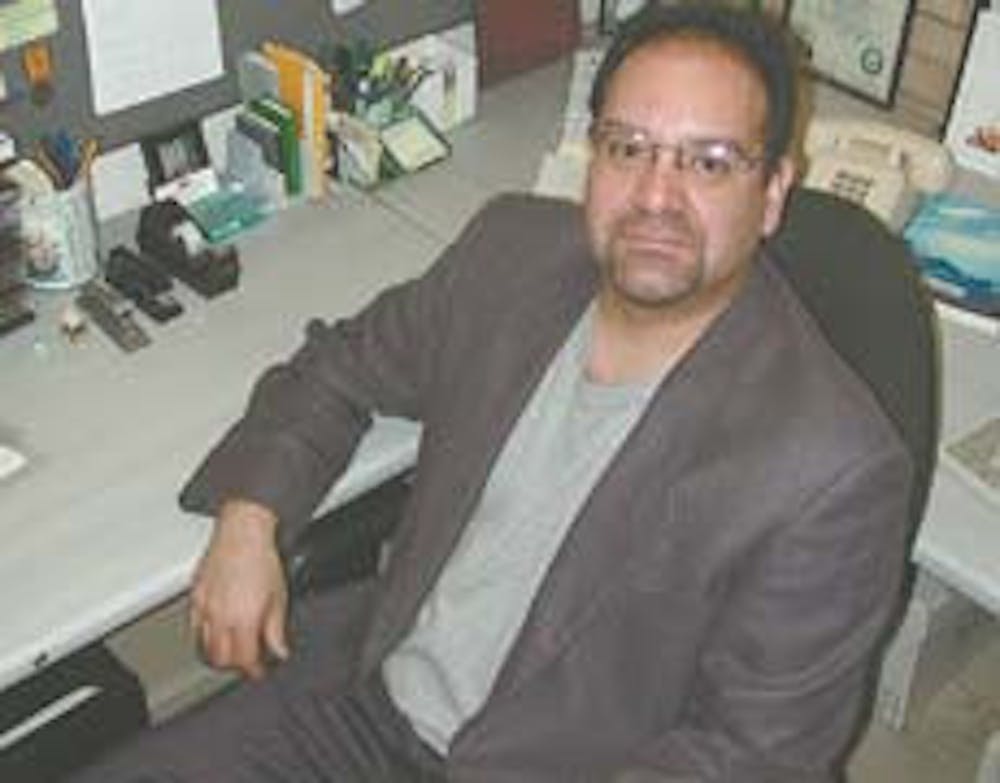A popular ASU sociology professor, who has been asked by his department to publish six scholarly papers within the next year-and-a-half, believes unreal expectations have been set for him in an effort to force him out.
Pete Padilla, assistant sociology professor of three years, was recently given a "conditional contract" - either publish the articles by the end of the 2003-04 school year or be fired.
Padilla said the excuse he was given for the conditional contract was that he was falling behind on research; but he believes he is being given an impossible task because the department dislikes his "controversial teaching style."
Mary Laner, a professor emerita who has worked for the sociology department for 27 years, said Padilla has "done a very good job for us" and is "very good with the students." She added that Padilla's situation is not uncommon.
"Every assistant professor there is comes in and either produces [research requirements] or they don't work here," Laner added. "If you don't do it, you don't stay. It's not at all extraordinary."
According to the department's requirements for promotion and tenure, assistant professors go through a "probationary period" from the time they are hired to the time they are up for tenure. Achieving tenure would mean Padilla would secure a permanent position without having to periodically renew his contract.
During the review for tenure, professors should "approach an average of about two articles a year," according to the department's requirements.
The most merit is given to articles produced solely by the professor and those published in "major national journals." The department literature also stipulates that enough articles should be published "to ensure a national reputation."
Verna Keith, the chair of the sociology department, declined to comment.
Padilla said he has had three articles published during his probationary period, and two of the articles were "shared," meaning not produced solely by him.
He said being assigned to two large Sociology 101 lecture classes with only one teaching assistant this past year did not leave him enough time to focus on research.
"My duty was teaching," he said. "[My job] is to disseminate the knowledge - that's what the public paid me for."
Padilla said he asked Keith for better TAs, smaller classes and release time from teaching one of his 101 classes, but the department did not fulfill any of his requests until after issuing the conditional contract.
"Had I got what I asked for [then], I wouldn't be here right now," he added.
Although Padilla was recently given release time, a research assistant and a smaller graduate class next semester, he is currently teaching a Sociology 101 class of about 500 students, which he said is an increased enrollment from past semesters.
"I'm asking for time off," Padilla said. "And they're giving me bigger classes."
While Padilla agreed that research is important, he said there are other factors that have contributed to his inability to meet the requirements, including negative feelings held by some members of the faculty.
He cited his "controversial teaching style" and his popularity among students as reasons for faculty prejudice.
His teaching style includes bringing in ex-convicts to talk to the class, allowing students to contribute to the structure of the class and making "everything game for discussion," like child pornography and molestation.
"If you say you like teaching, you're a pariah," Padilla said. "They tell me, 'Your office is like a Circle K; people always coming and going,' like it's a bad thing."
Padilla said comments like that - and other factors, such as not being granted release time to work on his research and being given the larger classes - also show the department's prejudice.
Laner said she does not think the faculty of the sociology department has treated Padilla with any prejudice.
"I never got release time," she said. "Nobody ever said, 'Hey, you get release time to do your research.' I taught a huge class...and I published a lot of articles. It's not out of the realm of doable."
Padilla said getting six articles published in the next year is a "seemingly impossible goal."
"Six is not going to happen," he said. "I would have understood three maybe, but not six."
Sociology senior Chris Amaro took one of Padilla's entry-level classes and said it would be a loss for the University if Padilla were let go.
"I really appreciated his class," Amaro said. "I'd go out of there every day just excited about what I had learned. He's the one that got me into sociology. I don't think [lack of research] is good grounds for firing, especially for that great of a teacher."
Amanda Lee Myers is the Editor-in-Chief of the Web Devil. Reach her at amanda.l.myers@asu.edu.




